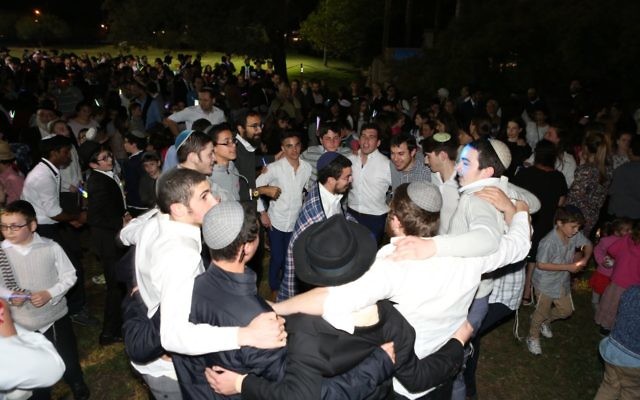Australia keeps it together
IN a mere year, the Shabbat Project has grown from a grassroots movement to a staple of the Australian Jewish calendar, with thousands of people across the country and close to 1,000,000 Jews around the world getting involved.
IN a mere year, the Shabbat Project has grown from a grassroots movement to a staple of the Australian Jewish calendar, with thousands of people across the country and close to 1,000,000 Jews around the world getting involved.
After almost 100 events, 6000 showbags, 3500 challah bake aprons and streets, parks, homes and communal institutions filled to the brim … the Shabbat Project wrapped up in Sydney on Saturday night with a bang.
“Over 10,000 Jews were touched in some way by the Shabbat Project in our community,” Shabbat Project Sydney leader Rabbi Benji Levy told The AJN.
“This year our focus was bringing together the many individual communities within our collective community under the common banner of Shabbat, and we were overwhelmed by the way in which each organisation and so many individuals took this on board.”
The event saw many firsts achieved, with Southern Sydney Synagogue holding a large Shabbat dinner, when last year it had to cancel due to lack of interest; Parramatta Synagogue holding a sold-out Shabbat dinner; more than 1500 people attending the kids’ mega challah bake on Wednesday at the Entertainment Quarter, with hundreds more scattered throughout the community; at least five different smaller shuls, who last year did not participate in the Shabbat Project, this year delivering activities with great attendance; the Russian community holding a sold-out Shabbat dinner; and 140 young adults attending a Shabbat dinner.
“The mood was electric. My favourite part was walking around on Shabbat, with less cars on the street and seeing smiling faces of families and friends engaged in conversation with one another,” Rabbi Levy said.
He said Dani Sueke’s inspirational message to more than 500 women at Moriah College, as well as having Shabbat lunch with more than 500 people overlooking the water at Dover Heights Shule and enjoying a fireworks extravaganza with more than 1000 people in Barracluff Park, were just some of the “amazing experiences I was privileged to personally be part of, and the knowledge of so many more wonderful events around the community is heartwarming”.
Terry Diamond, who had participated in the Shabbat Project last year, said she found the message of “disconnecting to reconnect” to be true, and had been looking forward to the opportunity to disconnect again this year.
“I think it’s an amazing opportunity to bring the power of Shabbat into our families and into our homes, and to spend some time connecting with Jewish values and traditions,” she said.
“The Shabbat Project facilitates that happening when it’s not something you do all the time.”
In Melbourne, meanwhile, Jews of all ages and from all denominations were united in the spirit of the occasion, with more than 2400 people baking challah and attending the havdalah concert at Caulfield Park, and hundreds attending dinners, lunches, shul services, picnics, talks and everything in between.
The festivities began last week with a day of challah baking for children at Chadstone shopping centre and continued until Saturday evening with the havdalah celebration that saw thousands dancing and singing under the fireworks display at Caulfield Park.
Describing the highlight of the weekend, co-chair of the Shabbat Project Melbourne Rabbi Moshe Kahn enthused that the “Pull Up A Chair” campaign exceeded the expectations of the organising committee as friends, neighbours and strangers came together to share a meal and “keep it together”.
“Pull Up A Chair was a new initiative for this year and was a real highlight. I keep getting positive messages from people, with street parties around Caulfield that saw 20 to 90 people attend, which is really beautiful,” Rabbi Kahn said.
With the initiative now in its second year, Rabbi Kahn said the community was better equipped to ensure the day was particularly memorable, with the Shabbat Project transforming into one of the principle events of the international Jewish calendar.
“I think we’ve created something really special; it’s become a day in the calendar, like Rosh Hashanah and Succot. It’s now the Shabbat Project weekend. That’s a pretty big accomplishment in a year.”
He added, “Last year we had to introduce people and convince them it’s for real year and this year was a different vibe. People and organisations wanted to get involved and asked how they could. There was no sales pitch this year. It’s a given now, sort of entrenched in the community.”
Looking to next year, Rabbi Kahn said the organising committee is seeking to double the number for the Glick’s Great Challah Bake, as tickets sold out in less than 10 days.
It saw around 2400 women and children gather at the Glick’s factory in Clayton for an evening of kneading, braiding and bonding.
Shabbat Project Melbourne coordinator Talya Rotman added, “After two successful years, we are already thinking about 2016 and what we should do. There will be an open discussion with our supporters before making any commitments about the future.”
In Canberra, 35 Bnei Akiva students from across the country joined the local community for a special Shabbat service. Events were also held in Ballarat, Brisbane and Perth.
Reflecting on the spirit of Shabbat, Rabbi Dovid Freilich of Perth Hebrew Congregation said keeping it is the only mitzvah that you observe by doing nothing.
“You sit and relax and you’re doing a mitzvah,” he explained, “and you know why, because you’re interacting with your family, you interact with your community and you interact with yourself and you reflect”.
For full coverage, see this week’s AJN.
EVAN ZLATKIS AND ZOE KRON


comments